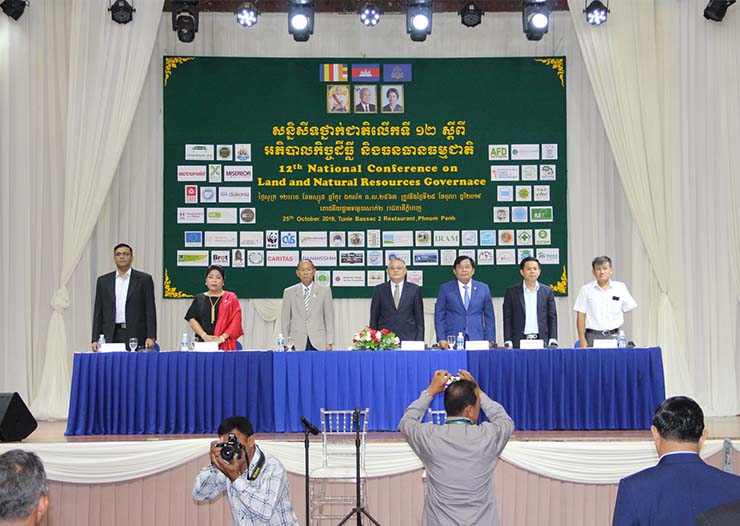
On October 25, 2019, there were 61 national and international NGOs co-organized 12th National Conference on Land and Natural Resources Governance at the Tonle Bassac II Restaurant in Phnom Penh. There were 518 participants (160 women) from representatives of parliament, European Union, private sector, development partners, civil society organizations, educators, Researchers, sub-national authorities, indigenous communities, fishing communities, forest communities, and journalists.
After paying great respect to the chairman of the conference, Dr. Tek Vannara, Executive Director of NGO Forum on Cambodia, thanked the representatives of the RGC and the parliaments for attending the morning session. He emphasized that the discussions at the conference should be honest and constructive. He raised the main topics of the conference including Indigenous Peoples and Forest Management, Land Policy and Governance, and Natural Resource Governance. The Royal Government of Cambodia national policies include the NSDP (2019 – 2023) SDG (2016 – 2030), the Green Growth Policy and the Fourth Revolution of the Digital Age.
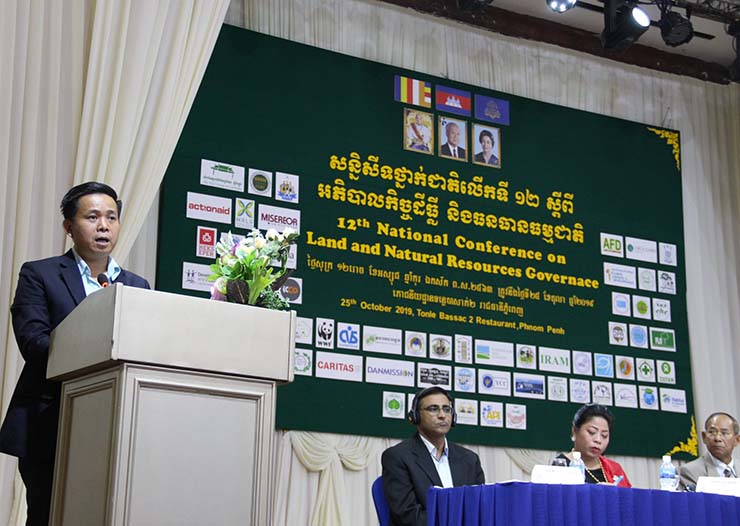
Dr. Vannara suggested some following important points for the communities:
- Strengthen on existing communities, including forestry, fishing communities, indigenous communities, ecotourism communities, and other communities by integrating knowledge and technology.
- Development partners, civil society organizations, governments, private sector, and relevant stakeholders strive to provide greater funding flow to subnational communities so that communities can participate in the safeguarding and enhancing natural resource governance.
- The involvement and collective of the community would be more proactively participate in environmental protection and conservation, as well as should be a role model for other communities to learn from.
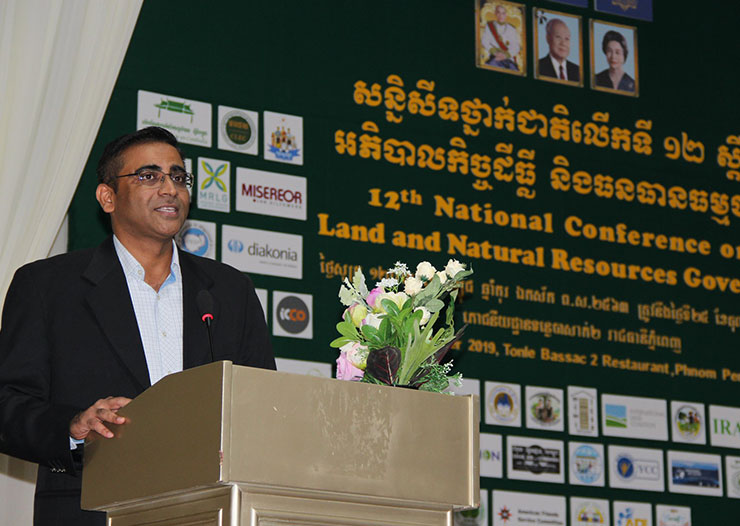
Mr. Biju Abraham, Representative of Oxfam, noted that Cambodia mainly focuses on economic growth and poverty reduction. Economic growth is very much related to land uses and land governance. At the same time, we are facing the challenge of climate change and natural resource degradation. In other words, all of these factors (economic growth, climate change, natural resources and national policies) are interrelated. At the same time, Cambodia has seen a rapid growth in population, which demands high food demand year after year. Oxfam also has programs in this regard. The programs implemented by Oxfam include:
• Climate Change
• Immigration
• Technology and Innovation
• Gender and Justice.
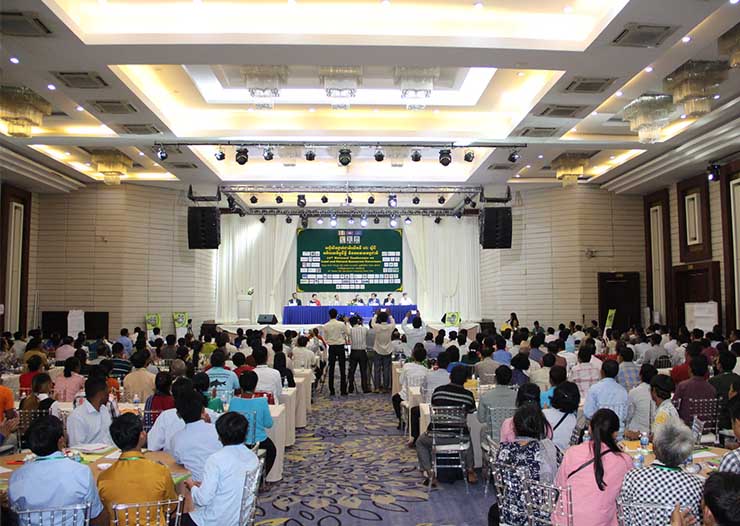
Along with the aforementioned programs, the organization has been contributing to law enforcement activities such as the Land Law since 1995 until the new land law was adopted in 2001. Our challenges with law enforcement are the clarity of each article, the scope of the law, and the different perceptions of stakeholders. Mr.Biju Abraham made some of the following recommendations.
• Let’s work together, multilaterally, on the governance and governance of land and natural resources.
• We must take a holistic approach to governance and natural resource management.
• Banks should focus on the governance of land and natural resources.
• The private and responsible sectors should co-operate, recognize and collaborate with communities living and using land and natural resources.
Before concluding his welcome speech, Mr. Biju Abraham wished the seminar to receive the fruitful discussion as expected.
Summary of the Results of the Conference and Closing Speech
At the end of the session of the conference, there were three main programs: Summary of the Results of the Conference, Official Hand-over the Written Results of the Conference to the Royal Government of Cambodia Representative and Closing Speech.
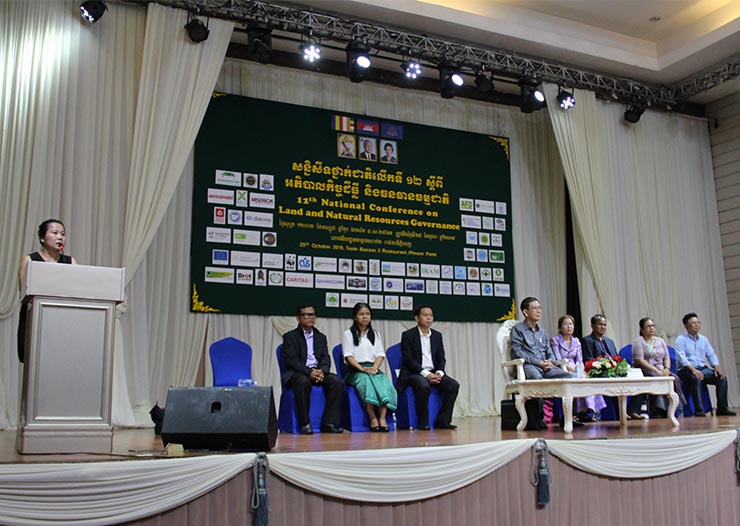
Ms. Chhim Ratana – Senior officer of ActionAid – summarized the results of the two-day conference as the following. On the 24th of October 2019, we achieved the pre-meeting with the three main statements on Land Management, Resettlement, and Natural Resources. The sector of Natural Resources is divided into three sub-themes including Indigenous People, Community Forestry and Community Fisheries. Each statement consists of four main sessions including achievements made by the Royal Government of Cambodia, Challenges, Suggestions, and Recommendations. The 12th National Conference was participated by 518 participants (160 women) represented from 61 NGOs and communities across the country. Speakers represented the Royal Government of Cambodia agreed to resolve or will bring the raised challenges to as highest possible decision-makers for further intervention.
Dr. Tek Vannara – Executive Director of the NGO Forum on Cambodia – and being as representative of all the Conference participants, officially handed-over the written results of the Conference to H.E. Ngan Chamroeun, Secretary of State and highly Representative of H.E. Samdech Kralahom Sar Kheng, Deputy Prime Minister and the Minister of Interior.
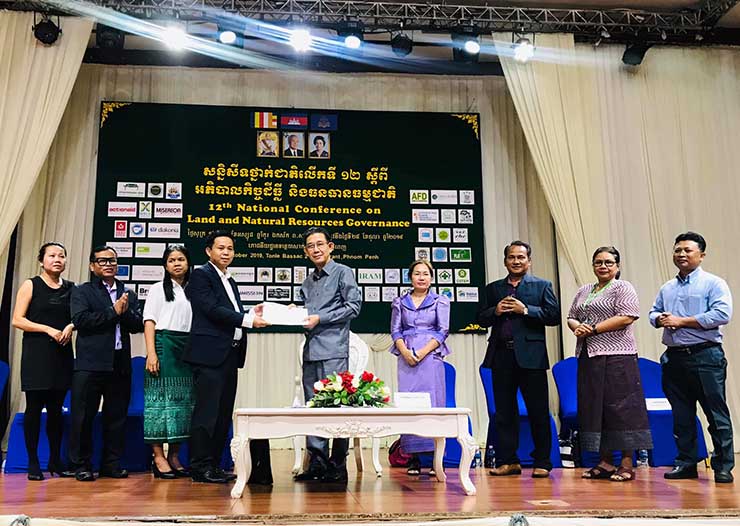
H.E. Ngnan Chamroeun – Secretary of State, Ministry of Interior (MoI), and on behalf of H.E. Samdech Kralahom Sar Kheng, Deputy Prime Minister and the Minister of Interior. His Excellency provided his remarks as the following.
The Royal Government has given Land Management as the first priority of its mandates. There is a Sub-Decree on Land Management dated since 2009. There are 137 registered with Communal Land Titles (CLT) by the Minister of Interior. It is noticed that the Ministry of Rural Development (MRD) is responsible for the registration of Indigenous People (IP) identification. After the recognition of the MRD, the Minister of Interior will register the IPs’ CLT.
As challenges happened on the CLT, problems faced with the IP themselves. Some members of the IP communities preferred to have their own land registered individually because they can use their land titling papers for banking. Some other problems include IP communities claimed areas of CLT more (bigger) than theirs, and some others the IP communities have been living dispersal areas. For those communities who are living within the Forest Domain or Protected Areas, they have to solve their problems with the sectoral ministries first prior to asking for CLT. Some other difficulties include the IP communities are living in remote areas where road infrastructures are difficult to access, which would take time and effort to work. The total 71 planned IP communities for CLT registration, there are 21 CLT were registered with the Ministry of Interior.
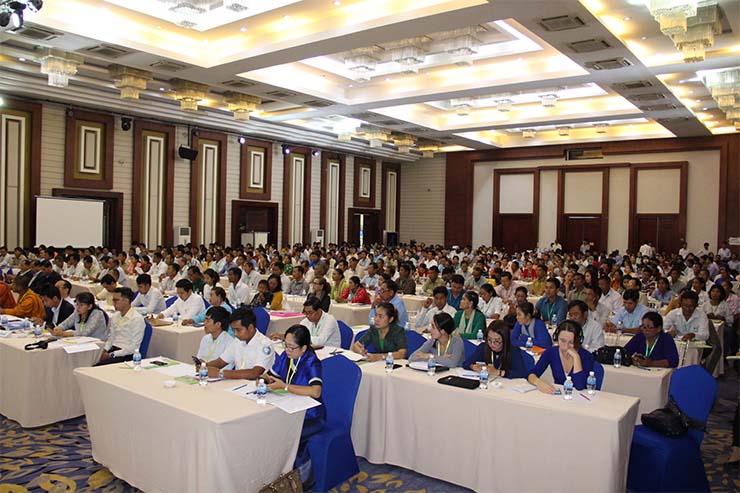
The Royal Government of Cambodia has been committed to better manage the country natural resources. For instance, the biodiversity of Keo Seima Wildlife Sanctuary of Mondulkiri province has been well protected. All seized illegal offended tools and equipment were destroyed. We also recognize the roles of sub-national authorities, communities, and partner agencies in the protection of natural resources. The Royal Government of Cambodia has been taken important tasks on the amendment of three laws, forestry, fisheries, and protected areas. The proposed amended new laws would give more opportunities to wider participate from different agencies rather than just the responsible ministries like agriculture, forestry and fisheries, and ministry of environment. The initiative of the amendment of the laws was started in 2011 by Samdech Akkak Moha Sena Padei Techo Hun Sen, the prime minister of the Royal Government of Cambodia. Parallel with the ideas of decentralized management of the natural resources, his Excellency gave experiences achieved by the authorities of Germany.
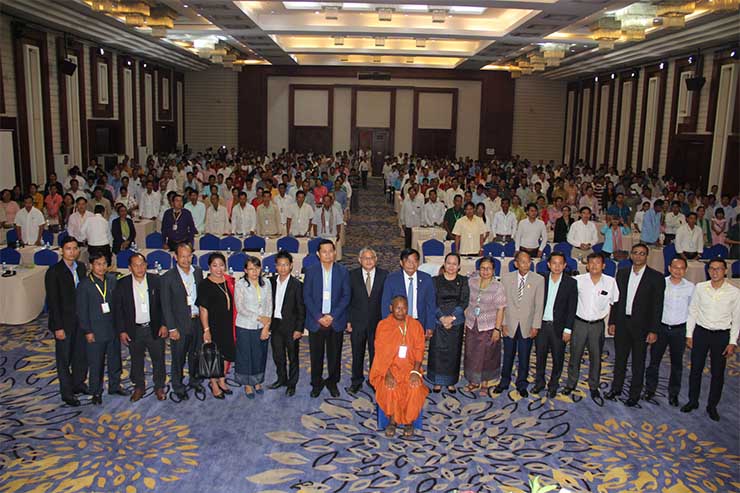
Conclusion and Recommendations
The Pre-meeting on the 12th National Conference on Land and Natural Resource Governance and the actual 12th National Conference on Land and Natural Resource Governance went smoothly well under friendly, straight forward, and productive occasions. Four Statements of the four agreed on themes – resettlement, Indigenous Peoples, Natural Resource, and Land governance – were produced and read to share among the government representatives.
The Conference recommended continuing to hold the National Conference annually with wider participation from the public institutions. The Discussion Groups should be smaller, around 10 people in each group (rather than about 30 people), for more efficient discussion. The recommendations could be synthesized at the later stage for the Conference. While keeping the Pre-meeting for one-day, as the same as this one, the future National Conference should be two days in order to give more time to speakers to comprehensively share their experiences and knowledge instead of one day as already held.